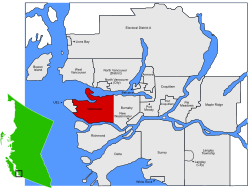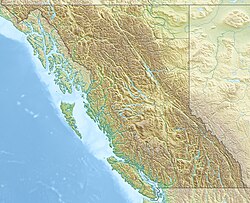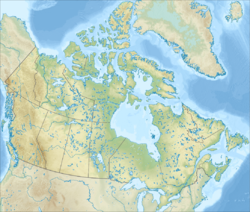Vancouver
Vancouver is a coastal city and major seaport on the mainland of southwestern British Columbia, Canada. The city has a population of over 630,000 and is the largest city in British Columbia. Metro Vancouver has a population of over 2 million people.[5] That makes it the third largest metropolitan area in Canada. Vancouver has a mix of people from different cultures. Fifty-two percent of city residents have a first language that is not English.[6][7]
Vancouver | |
|---|---|
| City of Vancouver | |
 | |
| Nickname: | |
| Motto(s): "By Sea, Land, and Air We Prosper" | |
 Location within Metro Vancouver in British Columbia, Canada | |
| Coordinates: 49°15′N 123°6′W / 49.250°N 123.100°W | |
| Country | Canada |
| Province | British Columbia |
| Region | Lower Mainland |
| Incorporated | April 6, 1886 |
| Named for | Captain George Vancouver R.N., (1757-1798), explored 1792 for British Royal Navy |
| Government | |
| • Mayor | Ken Sim |
| • City Council | List of Councillors |
| • MPs (Fed.) | List of MPs |
| • MLAs (Prov.) | List of MLAs |
| Area | |
| • City | 123.63 km2 (47.73 sq mi) |
| • Land | 115.18 km2 (44.47 sq mi) |
| • Urban | 911.64 km2 (351.99 sq mi) |
| • Metro | 2,878.93 km2 (1,111.56 sq mi) |
| Elevation | 0–152 m (0–501 ft) |
| Population | |
| • City | 662,248 (8th) |
| • Density | 918.0/km2 (2,378/sq mi) |
| • Urban | 2,264,823[1] |
| • Metro | 2,642,825 (3rd) |
| • Metro density | 918.0/km2 (2,378/sq mi) |
| Demonym | Vancouverite |
| Time zone | UTC−8 (PST) |
| • Summer (DST) | UTC−7 (PDT) |
| Forward sortation area | |
| Area codes | 604, 778, 236, 672 |
| NTS Map | 092G03 |
| GNBC Code | JBRIK |
| Highways | |
| GDP | US$ 154.3 billion[4] |
| GDP per capita | US$58,384[4] |
| Website | City of Vancouver |
History
changeNative People began living in this area around 10,000-8,000 years ago. These people were part of three main groups: the Squamish, Musqueam, and Tsleil-Waututh.[8][9]
Vancouver was founded in 1886, and is named after British naval captain George Vancouver. Captain Vancouver explored the area around Vancouver and Vancouver Island in the 1790s.
Buildings and information
changeThe University of British Columbia is in Vancouver.
Vancouver also has Stanley Park which has beaches and totem poles. Nearby is Grouse Mountain which has good skiing and has a 2.9 km (1.8 mi.) hiking trail which is known as the Grouse Grind. Grouse Mountain also has an animal sanctuary, including wolves and bears.
The Lions Gate Bridge is also in Stanley Park, Vancouver.
Sports
changeVancouver has two ice hockey teams, the Vancouver Canucks (who play for the National Hockey League) and the Vancouver Giants (who play for the Western Hockey League).
The BC Lions of the Canadian Football League are based in Vancouver. The team has won 6 Grey Cups.
In soccer, Vancouver is home to the Vancouver Whitecaps FC. They play in the Major League Soccer (MLS).
The 2010 Winter Olympics were held in Vancouver and it was the first time Canada won a gold medal on Canadian soil.
Geography
changeVancouver is on a peninsula on the West Coast of Canada, less than a one-hour drive north of the Canada-U.S. border. Between Vancouver and the Pacific Ocean to the west is a large island called Vancouver Island. Until the city was named in 1885, "Vancouver" referred to Vancouver Island. Some people mistakenly think that the city is on Vancouver Island. On the south shore of Vancouver is the Fraser River, which flows west into the Strait of Georgia. The water along the north shore is called Burrard Inlet. The city has an area of 114 square kilometres (44 sq mi). The larger metropolitan area is 2,878 square kilometres (1,111 sq mi). As with most of British Columbia, Vancouver is in the Pacific Time Zone (UTC−8).
Climate
changeVancouver has an oceanic climate (Cfb in the Köppen climate classification). The average precipitation per year is 1189 mm, mostly from October to April. High temperatures in the summer average 22 °C. The highest temperature ever recorded was 34.4 °C on July 30, 2009. On average, snow falls on only 11 days per year. The snow is usually wet, not very deep, and melts in the rain. On average, on only 4.5 days a year does the temperature not rise above freezing.
| Climate data for Vancouver International Airport (Richmond), 1981–2010 normals, extremes 1898–present[a] | |||||||||||||
|---|---|---|---|---|---|---|---|---|---|---|---|---|---|
| Month | Jan | Feb | Mar | Apr | May | Jun | Jul | Aug | Sep | Oct | Nov | Dec | Year |
| Record high humidex | 17.2 | 18.0 | 20.3 | 23.9 | 33.7 | 33.9 | 38.3 | 35.9 | 33.0 | 27.2 | 21.1 | 16.1 | 38.3 |
| Record high °C (°F) | 15.3 (59.5) |
18.4 (65.1) |
20.0 (68.0) |
26.1 (79.0) |
30.4 (86.7) |
33.3 (91.9) |
34.4 (93.9) |
33.3 (91.9) |
30.0 (86.0) |
25.0 (77.0) |
20.1 (68.2) |
15.0 (59.0) |
34.4 (93.9) |
| Average high °C (°F) | 6.9 (44.4) |
8.2 (46.8) |
10.3 (50.5) |
13.2 (55.8) |
16.7 (62.1) |
19.6 (67.3) |
22.2 (72.0) |
22.2 (72.0) |
18.9 (66.0) |
13.5 (56.3) |
9.2 (48.6) |
6.3 (43.3) |
13.9 (57.0) |
| Daily mean °C (°F) | 4.1 (39.4) |
4.9 (40.8) |
6.9 (44.4) |
9.4 (48.9) |
12.8 (55.0) |
15.7 (60.3) |
18.0 (64.4) |
18.0 (64.4) |
14.9 (58.8) |
10.3 (50.5) |
6.3 (43.3) |
3.6 (38.5) |
10.4 (50.7) |
| Average low °C (°F) | 1.4 (34.5) |
1.6 (34.9) |
3.4 (38.1) |
5.6 (42.1) |
8.8 (47.8) |
11.7 (53.1) |
13.7 (56.7) |
13.8 (56.8) |
10.8 (51.4) |
7.0 (44.6) |
3.5 (38.3) |
0.8 (33.4) |
6.8 (44.2) |
| Record low °C (°F) | −17.8 (0.0) |
−16.1 (3.0) |
−9.4 (15.1) |
−3.3 (26.1) |
0.6 (33.1) |
2.2 (36.0) |
6.1 (43.0) |
3.9 (39.0) |
−1.1 (30.0) |
−6.1 (21.0) |
−14.3 (6.3) |
−17.8 (0.0) |
−17.8 (0.0) |
| Record low wind chill | −22.6 | −21.2 | −14.5 | −5.4 | 0.0 | 0.0 | 0.0 | 0.0 | 0.0 | −11.4 | −21.3 | −27.8 | −27.8 |
| Average precipitation mm (inches) | 168.4 (6.63) |
104.6 (4.12) |
113.9 (4.48) |
88.5 (3.48) |
65.0 (2.56) |
53.8 (2.12) |
35.6 (1.40) |
36.7 (1.44) |
50.9 (2.00) |
120.8 (4.76) |
188.9 (7.44) |
161.9 (6.37) |
1,189 (46.81) |
| Average rainfall mm (inches) | 157.5 (6.20) |
98.9 (3.89) |
111.8 (4.40) |
88.1 (3.47) |
65.0 (2.56) |
53.8 (2.12) |
35.6 (1.40) |
36.7 (1.44) |
50.9 (2.00) |
120.7 (4.75) |
185.8 (7.31) |
148.3 (5.84) |
1,153.1 (45.38) |
| Average snowfall cm (inches) | 11.1 (4.4) |
6.3 (2.5) |
2.3 (0.9) |
0.3 (0.1) |
0.0 (0.0) |
0.0 (0.0) |
0.0 (0.0) |
0.0 (0.0) |
0.0 (0.0) |
0.1 (0.0) |
3.2 (1.3) |
14.8 (5.8) |
38.1 (15.0) |
| Average precipitation days (≥ 0.2 mm) | 19.5 | 15.4 | 17.7 | 14.8 | 13.2 | 11.5 | 6.3 | 6.7 | 8.3 | 15.4 | 20.4 | 19.7 | 168.9 |
| Average rainy days (≥ 0.2 mm) | 18.4 | 14.7 | 17.5 | 14.8 | 13.2 | 11.5 | 6.3 | 6.8 | 8.3 | 15.4 | 19.9 | 18.4 | 165.2 |
| Average snowy days (≥ 0.2 cm) | 2.6 | 1.4 | 0.9 | 0.2 | 0.0 | 0.0 | 0.0 | 0.0 | 0.0 | 0.03 | 0.8 | 2.8 | 8.73 |
| Average relative humidity (%) | 81.2 | 74.5 | 70.1 | 65.4 | 63.5 | 62.2 | 61.4 | 61.8 | 67.2 | 75.6 | 79.5 | 80.9 | 70.3 |
| Mean monthly sunshine hours | 60.2 | 91.0 | 134.8 | 185.0 | 222.5 | 226.9 | 289.8 | 277.1 | 212.8 | 120.7 | 60.4 | 56.5 | 1,937.5 |
| Percent possible sunshine | 22.3 | 31.8 | 36.6 | 45.0 | 46.9 | 46.8 | 59.3 | 62.1 | 56.1 | 36.0 | 21.9 | 22.0 | 40.6 |
| Average ultraviolet index | 1 | 1 | 3 | 4 | 6 | 6 | 7 | 6 | 4 | 2 | 1 | 1 | 4 |
| Source: Environment Canada[12][13][14][15][16][17][18][19][20][21][22][23][24][25] and Weather Atlas[26] | |||||||||||||
Housing in Vancouver
changeVancouver has had a housing affordability crisis for many years.[27] It came in as the second-least affordable housing market compared with 90 other metropolitan areas in different countries. The only place considered less affordable was Hong Kong.[28]
Vancouver has been criticized for saying that it provides many social housing units to residents. However social housing can refer to small apartments renting for $1,700 per month. There are people with household incomes of up to $120,000 living in social housing in Vancouver.[29]
The government has been attempting to address the housing crisis situation by imposing a series of taxes such as the Foreign-buyers tax and Empty Homes Tax in 2016 and Speculation tax in 2018.
Rents in Vancouver were very high, and apartment vacancies were very low in 2019.[30]
Media
changeTelevision
changeNewspapers
changeInternet Media
change- The Tyee
- NowPublic
- Daily Hive
Notable people
changeNotes
changeReferences
change- ↑ Census Profile, 2016 Census
- ↑ "Population and dwelling counts: Canada, provinces and territories, census metropolitan areas and census agglomerations". Statistics Canada. February 9, 2022. Retrieved October 1, 2023.
- ↑ "Data table, Census Profile, 2021 Census of Population - Vancouver, City (CY) [Census subdivision], British Columbia". Statistics Canada. February 9, 2022. Retrieved October 1, 2023.
- ↑ 4.0 4.1 "Table 36-10-0468-01 Gross domestic product (GDP) at basic prices, by census metropolitan area (CMA) (x 1,000,000)". Statistics Canada. January 27, 2017. Archived from the original on January 22, 2021. Retrieved April 27, 2021.
- ↑ "Province of British Columbia and Greater Vancouver Transit Authority (TransLink) Facts 2008" (PDF). Government of Canada. Archived from the original (PDF) on 2008-06-24. Retrieved 2007-12-01.
- ↑ "2006 Census: Population by mother tongue - cities". Archived from the original on 2008-01-26. Retrieved 2007-12-17.
- ↑ "City Facts 2004" (PDF). City of Vancouver. Archived from the original (PDF) on 2006-02-06. Retrieved 2006-11-11.
- ↑ Thom, Brian (1996). "Stó:lo Culture - Ideas of Prehistory and Changing Cultural Relationships to the Land and Environment". Archived from the original on 2007-07-18. Retrieved 2006-11-23.
- ↑ Carlson, Keith Thor, ed. (2001). A Stó:lō-Coast Salish Historical Atlas. Vancouver, BC: Douglas & McIntyre. pp. 6–18. ISBN 1-5505-4812-3.
- ↑ "Daily Data Report for October 1898". Environment Canada. 31 October 2011. Retrieved 27 April 2016.
- ↑ "Monthly Data Report for 1937". Environment Canada. 31 October 2011. Retrieved 12 May 2016.
- ↑ "1981 to 2010 Canadian Climate Normals". Environment Canada. 2015-09-22. Climate ID: 1108447. Retrieved 2016-05-09.
- ↑ "Daily Data Report for March 1941". Canadian Climate Data. Environment Canada. 31 October 2011. Retrieved 12 May 2016.
- ↑ "Daily Data Report for April 1934". Canadian Climate Data. Environment Canada. 31 October 2011. Retrieved 12 May 2016.
- ↑ "Daily Data Report for June 1925". Canadian Climate Data. Environment Canada. 31 October 2011. Retrieved 12 May 2016.
- ↑ "Daily Data Report for September 1944". Canadian Climate Data. Environment Canada. 31 October 2011. Retrieved 12 May 2016.
- ↑ "Daily Data Report for October 1934". Canadian Climate Data. Environment Canada. 31 October 2011. Retrieved 12 May 2016.
- ↑ "Daily Data Report for December 1939". Canadian Climate Data. Environment Canada. 31 October 2011. Retrieved 12 May 2016.
- ↑ "Daily Data Report for June 1901". Canadian Climate Data. Environment Canada. 31 October 2011. Retrieved 12 May 2016.
- ↑ "Daily Data Report for July 1909". Canadian Climate Data. Environment Canada. Retrieved 12 May 2016.
- ↑ "Daily Data Report for August 1910". Canadian Climate Data. Environment Canada. 31 October 2011. Retrieved 12 May 2016.
- ↑ "Daily Data Report for September 1908". Canadian Climate Data. Environment Canada. 31 October 2011. Retrieved 12 May 2016.
- ↑ "Daily Data Report for October 1935". Canadian Climate Data. Environment Canada. 31 October 2011. Retrieved 12 May 2016.
- ↑ "Calculation Information". Environment Canada. 31 October 2011. Retrieved 2016-05-12.
- ↑ "Daily Data Report for November 2016". Canadian Climate Data. Environment Canada. 31 October 2011. Retrieved 9 November 2016.
- ↑ d.o.o, Yu Media Group. "Vancouver, Canada - Detailed climate information and monthly weather forecast". Weather Atlas. Retrieved 2019-07-06.
- ↑ Douglas Todd: Vancouver's housing crisis four decades in the making
- ↑ Why Ottawa’s attempts to help young Canadians afford housing simply won’t work
- ↑ Dan Fumano: 'Call it what it is' — Most Vancouver 'social housing' geared to $50,000+ incomes
- ↑ A desperate housing situation calls for desperate measures
Other websites
change| Definitions from Wiktionary | |
| Media from Commons | |
| News stories from Wikinews | |
| Quotations from Wikiquote | |
| Source texts from Wikisource | |
| Textbooks from Wikibooks | |
| Travel guide from Wikivoyage | |
| Learning resources from Wikiversity | |
- Official City of Vancouver website
- Tourism Vancouver Archived 2015-08-23 at the Wayback Machine




